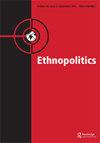Indigenous Land Rights and Contentious Politics in Africa: The Case of Uganda
IF 1.2
Q3 ETHNIC STUDIES
引用次数: 0
Abstract
Abstract This article uses a case study of Uganda to examine the contentious politics surrounding Indigenous land rights in contemporary Africa, notably regarding the right to ‘free, prior and informed consent’ (FPIC). Drawing upon insights from recent fieldwork, it contrasts the diverse struggles of two of Uganda's most prominent Indigenous groups. Whereas the Batwa constitute a small group of (traditionally) hunter-gatherers from the southwestern District of Kisoro (and surrounding areas) who have low capacity to challenge the state, the Karamojong are a much larger group of agro-pastoralists from the northeastern region of Karamoja who have a long history of conflict and opposition to the central government. These cases highlight the diverging capacities of groups to protect their traditional lands, yet their shared struggle to secure both legal recognition as Indigenous and their right to FPIC from a hostile government. Given the obstacles facing these groups and the potential for FPIC to deepen cleavages between—and within—communities, the article concludes with some reflections for advancing the rights of Uganda's Indigenous peoples without enflaming the divisive identity politics that can accompany Indigenous land rights movements in certain political contexts.非洲土著土地权利与充满争议的政治——以乌干达为例
摘要本文以乌干达为例,考察了当代非洲围绕土著土地权利的争议政治,特别是关于“自由、事先和知情同意”的权利。根据最近实地调查的见解,它对比了乌干达两个最著名的土著群体的不同斗争。巴特瓦人是来自基索罗西南部地区(及周边地区)的一小群(传统上)狩猎采集者,他们挑战国家的能力很低,而卡拉莫宗人是来自卡拉莫贾东北部地区的一大群农业牧民,他们有着长期的冲突和反对中央政府的历史。这些案件突显了各群体在保护其传统土地方面的不同能力,但他们为确保土著人的法律承认和从敌对政府获得FPIC的权利而进行的共同斗争。考虑到这些群体面临的障碍,以及FPIC加深社区之间和社区内部分裂的可能性,文章最后提出了一些思考,以促进乌干达土著人民的权利,而不加剧在某些政治背景下伴随土著土地权利运动而来的分裂性身份政治。
本文章由计算机程序翻译,如有差异,请以英文原文为准。
求助全文
约1分钟内获得全文
求助全文

 求助内容:
求助内容: 应助结果提醒方式:
应助结果提醒方式:


